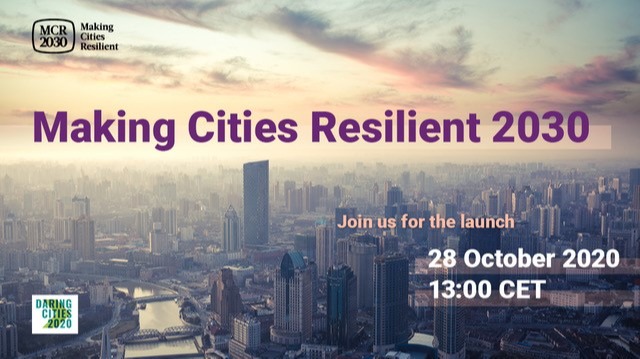

The Making Cities Resilient (MCR) Campaign was launched in 2010 with the primary aim to raise awareness and commitment of local governments and political leaders on disaster risk reduction. More than 4,300 cities have become part of the Campaign, demonstrating increased commitment to take actions to ensure the safety and well-being of citizens from disasters and crisis.
The MCR Campaign is due to end in 2020. Cities development partners and a variety of stakeholders unanimously requested that the efforts to support local governments in strengthening disaster and climate resilience must continue. Following a series of consultations held between 2018-2019, it is clear that cities are seeking capacity development guidance in various technical areas ranging from awareness and strategic planning, to effective implementation of the risk-informed urban development plans. This includes, for example, the capacity to finance for resilience; engagement of multi-sectoral and multi-stakeholder groups such as communities, vulnerable population, private sector; the use of nature-based solutions for resilience; the reduction of climate risks through appropriate actions, and others.
Making Cities Resilient 2030 (MCR2030)
The inputs from the consultations held in 2018-2019 have informed the design of the successor of the MCR Campaign – known as the Making Cities Resilient 2030 (MCR2030). Looking beyond 2020, there is an urgent need to accelerate the progress of resilience building at the local level, to bring cities on to the resilience pathway towards achieving the Sendai Framework for Disaster Risk Reduction, the New Urban Agenda, the Paris Agreement and the Sustainable Development Goals, by 2030. There is a need for a more collaborative approach among partners to provide support for a successful implementation of measures to enhance disaster resilience at the local level.
The initial design of MCR2030 was first shared publicly at the World Urban Forum on 9 February 2020 in Abu Dhabi, United Arab Emirates, with clear commitment from partners including United Cities and Local Governments (UCLG), ICLEI, the World Bank, UN-Habitat, the World Council on City Data, the Global Resilient Cities Network (by the Rockefeller Foundation), International Federation of Red Cross and Red Crescent Societies (IFRC) and the United Nations Office for Disaster Risk Reduction (UNDRR)[1].
The main strategic objectives of the MCR2030 include:
- Strategic Objective 1: Increase city understanding of risk and commitments to disaster risk reduction and resilience
- Strategic Objective 2: Increase city capacities to plan for risk reduction and resilience
- Strategic Objective 3: Increase city capacities to implement resilience actions and reduce risks
- Cross-cutting Objective: Increase vertical links with the national governments and horizontal links amongst local partners, mainstreaming resilience throughout and between partners, functions and services, and foster city-to-city partnerships and sharing of experience.
The MCR2030 was launched on 28 October 2020, 13:00-14:30 CET, at the Daring Cities 2020 online event, for operation starting in 2021.
For more information about the launch, click here.
For more information about the MCR2030, visit the MCR2030 website.
********** Partnership for MCR2030:
MCR2030 will be calling for partners who commit to accelerate the progress in making cities resilient from 2020 till 2030, both at the global and regional levels. Partners should have a clear offer which contributes to the achievement of MCR2030 objectives.
The target partners include, but not limited to:
- Development partners such as the UN agencies, global and regional non-governmental organizations, bilateral and multilateral donors
- National government such as ministries responsible for urban development, local government, climate change adaptation and disaster risk management
- National associations of municipalities
- Local governments
- Private sector entities, consultancies
- Academia and research institutes
The form for the expression of interest for MCR2030 partnership will be available on the MCR2030 website.
News on MCR2030:
9 February 2020 - MCR2030 unveiled at World Urban Forum
10 February 2020 - Resilient Cities: governments must engage
Reference:
[1] https://wuf.unhabitat.org/sites/default/files/2020-02/WUF10_final_declared_actions.pdf
Back